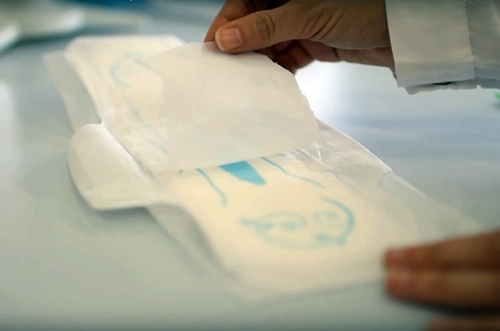
UCap microfiber pad (Hebrew University of Jerusalem)
14 January 2016. A team at Hebrew University in Jerusalem designed a microfiber pad to improve collection of urine samples from people with urinary tract infections. Graduate students from a number of disciplines developed the pad under in the Israeli university’s Biodesign medical innovation program.
Infections can occur anywhere in the urinary tract, but happen most often in the lower tract, involving the bladder and urethra. While infections can affect men and women, women are at greater risk. Urinary tract infections can be painful, but if they spread to to the kidneys, permanent kidney damage can result, as well as sepsis, a potentially life-threatening infection. National Institute of Diabetes and Digestive and Kidney Diseases says urinary tract infections are the second-most common type of infection, accounting for 8.1 million doctor visits each year in the U.S.
Diagnosing a urinary tract infection requires collecting an uncontaminated urine sample from patients, which for some segments of the population — e.g., infants and elderly — can be difficult. In these cases, clinicians use invasive catheters or adhesive plastic bags that often are contaminated with bacteria from the skin or fecal matter. “Contamination is so common,” says cardiologist Orlev Amir in a Hebrew University statement, “that physicians often needlessly prescribe broad-spectrum antibiotics prophylactically, increasing the risk of developing antibiotic resistant bacteria.”
Amir is part of a team addressing this problem, working with engineering and business students under Hebrew University Biodesign program. The team’s solution, which they call UCap, is a non-invasive pad made with hollow glass microfibers that draw in a urine sample in a few seconds through capillary action, while a surrounding polymer matrix captures the remaining urine. UCap’s developers say the pad works so quickly that cross-contamination is prevented.
Engineering graduate students Eliezer Keinan and Nitzan Guberman designed the UCap device. MBA students Itai Monnickendam and Simi Hinden estimate more than 11 million urine tests are carried out with infants and elderly in the U.S. each year, which represents a market of $100 million.
The Biodesign program combines engineering and business graduate students with medical research fellows to learn about the process of taking medical devices to market. Biodesign participants receive instruction from medical and engineering faculty, but also practitioners in intellectual property and finance. Teams of participants already developed prototype devices to guide intravenous catheters, ease insertion of tracheal tubes, anchor small intestine bypass tubes in bariatric surgery, and digitally capture three-dimensional impressions for 3-D printing of dentures.
The Biodesign team members tell more about the device in the following video.
- Smart Pills Detect, Measure Gases in Gut
- Phillips, Banyan Partner on Point-of-Care Concussion Test
- Trial Underway Testing Preterm Respiratory Treatment
- Airway-on-Chip Model Simulates Asthma, COPD
- Nanofibers, Stem Cells Studied for Rotator Cuff Repair
* * *

 RSS - Posts
RSS - Posts
You must be logged in to post a comment.